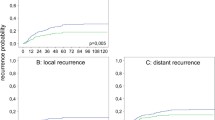Abstract
Surgery for rectal cancer continues to develop towards improving local control and overall survival, maintaining quality of life and preserving sphincter, genitourinary and sexual function. The multidisciplinary approach integrated in a team of different specialists ensures an individualised treatment for each patient with rectal cancer. Thus, the role of the pathologist has acquired an important relevance, not only in diagnosis, management and evaluation of the surgical specimen, but also for selection of the best adjuvant treatment. Parameters such as macroscopic quality of the mesorectum, status of the circumferential margin and lymph node harvest are considered basic criteria by current guidelines. Additionally, consistency in reporting based on the histologic classification proposed by the World Health Organization (WHO) is mandatory, along with inclusion into the pathologic report of current criteria for tumour node metastasis (TNM) staging, assessment of response to neoadjuvant chemoradiation therapy and clinically relevant molecular studies. Detection of defects in mismatch repair genes and mutational analysis of specific genes should be included as predictive markers for therapy.
Similar content being viewed by others
References
Heald RJ (1988) The ‘Holy Plane’ of rectal surgery. J R Soc Med 81:503–508
Nelson H, Sargent DJ (2001) Refi ning multimodal therapy for rectal cancer. N Engl J Med 345:690–692
García-Granero E, Faiz O, Muñoz E et al (2009) Macroscopic assessment of mesorectal excision in rectal cancer: a useful tool for improving quality control in a multidisciplinary team. Cancer 115(15):3400–3411
Hall NR, Finan PJ, al-Jaberi T et al (1998) Circumferential margin involvement after mesorectal excision of rectal cancer with curative intent. Predictor of survival but not local recurrence? Dis Colon Rectum 41:979–983
den Dulk M, Putter H, Collette L et al (2009) The abdominoperineal resection itself is associated with an adverse outcome: the European experience based on a pooled analysis of fi ve European randomised clinical trials on rectal cancer. Eur J Cancer 45:1175–1183
Salerno G, Daniels IR, Moran BJ et al (2006) Clarifying margins in the multidisciplinary management of rectal cancer: the MERCURY experience. Clin Radiol 61:916–923
College of American Pathologists, Cancer Protocols 2010. Available at http://www.cap.org/apps/docs/committees/cancer/cancer_protocols/2009/Colon_09protocol.pdf
Quirke P (2003) Training and quality assurance for rectal cancer: 20 years of data is enough. Lancet Oncol 4:695–702
Quirke P, Durdey P, Dixon MF, Williams NS et al (1986) Local recurrence of rectal adenocarcinoma due to inadequate surgical resection. Histopathological study of lateral tumour spread and surgical excision. Lancet 2:996–999
Mekenkamp LJ, van Krieken JH, Marijnen CA et al (2009) Lymph node retrieval in rectal cancer is dependent on many factors-the role of the tumour, the patient, the surgeon, the radiotherapist, and the pathologist. Am J Surg Pathol 33(10):1547–1553
Edge SB, Byrd DR, Carducci MA, Compton CC (eds) (2009) AJCC cancer staging manual. 7th edn. Springer, New York
Kang H, O’Connell JB, Maggard MA et al (2005) A 10-year outcomes evaluation of mucinous and signet-ring cell carcinoma of the colon and rectum. Dis Colon Rectum 48(6):1161–1168
Bernick PE, Klimstra DS, Shia J et al (2004) Neuroendocrine carcinomas of the colon and rectum. Dis Colon Rectum 47(2):163–169
Wick MR, Vitsky JL, Ritter JH et al (2005) Sporadic medullary carcinoma of the colon: a clinicopathologic comparison with nonhereditary poorly differentiated enteric-type adenocarcinoma and neuroendocrine colorectal carcinoma. Am J Clin Pathol 123:56–65
Tsai HL, Chu KS, Huang YH et al (2009) Predictive factors of early relapse in UICC stage I-III colorectal cancer patients after curative resection. J Surg Oncol 100:736–743
Sauer R, Becker H, Hohenberger W et al (2004) Preoperative versus postoperative chemoradiotherapy for rectal cancer. N Engl J Med 351:1731–1740
Umar A, Boland CR, Terdiman JP et al (2004) Revised Bethesda guidelines for hereditary nonpolyposis colorectal cancer (Lynch syndrome) and microsatellite instability. J Natl Cancer Inst 96(4):261–268
Greenson JK, Bonner JD, Ben-Yzhak O et al (2003) Phenotype of microsatellite unstable colorectal carcinomas. Am J Surg Pathol 27(5):563–570
Snover DC, Jass JR, Fenoglio-Preiser C, Batts KP (2005) Serrated polyps of the large intestine: a morphologic and molecular review of an evolving concept (see comment). Am J Clin Pathol 124(3):380–391
Ribic CM, Sargent DJ, Moore MJ et al (2003) Tumour microsatellite-instability status as a predictor of benefi t from fl uorouracil-based adjuvant chemotherapy for colon cancer. N Engl J Med 249(3):247–257
Lievre A, Bachet J-B, Le Corre D et al (2006) KRAS mutation status is predictive of response to cetuximab therapy in colorectal cancer. Cancer Res 66(8):3992–3995
Amado RG, Wolf M, Peters M et al (2008) Wildtype KRAS is required for panitumumab effi cacy in patients with metastatic colorectal cancer. J Clin Oncol 26(10):1626–1634
van Krieken JH, Jung A, Kirchner T et al (2008) KRAS mutation testing for predicting response to anti-EGFR therapy for colorectal carcinoma: proposal for an European quality assurance program. Virchows Arch 453(5):417–431
Bessa X, Balleste B, Andreu M et al (2008) A prospective, multicenter, population-based study of BRAF mutational analysis for Lynch syndrome screening. Clin Gastroenterol Hepatol 6(2):206–214
Author information
Authors and Affiliations
Corresponding author
Rights and permissions
About this article
Cite this article
Rojo, A., Toledo, G., García, J.F. et al. Update on the surgical pathology standards on rectal cancer diagnosis, staging and quality assessment of surgery. Clin Transl Oncol 12, 431–436 (2010). https://doi.org/10.1007/s12094-010-0530-8
Received:
Accepted:
Published:
Issue Date:
DOI: https://doi.org/10.1007/s12094-010-0530-8




